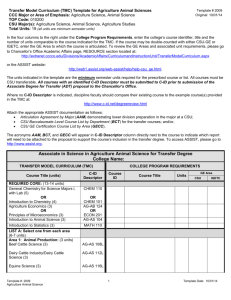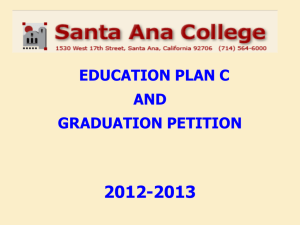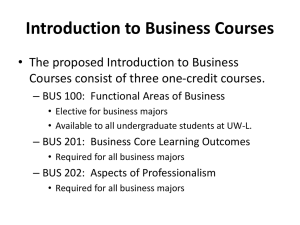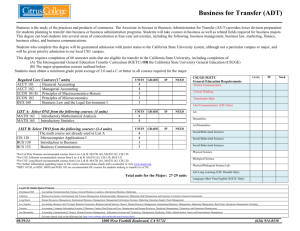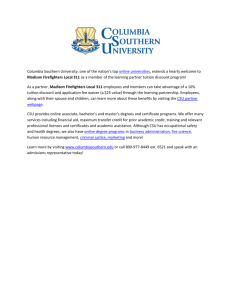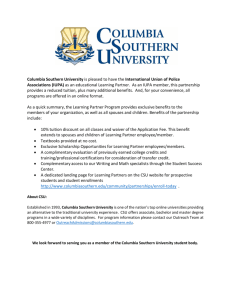Undergraduate Committee March 7, 2012 Minutes Present: Michelle
advertisement
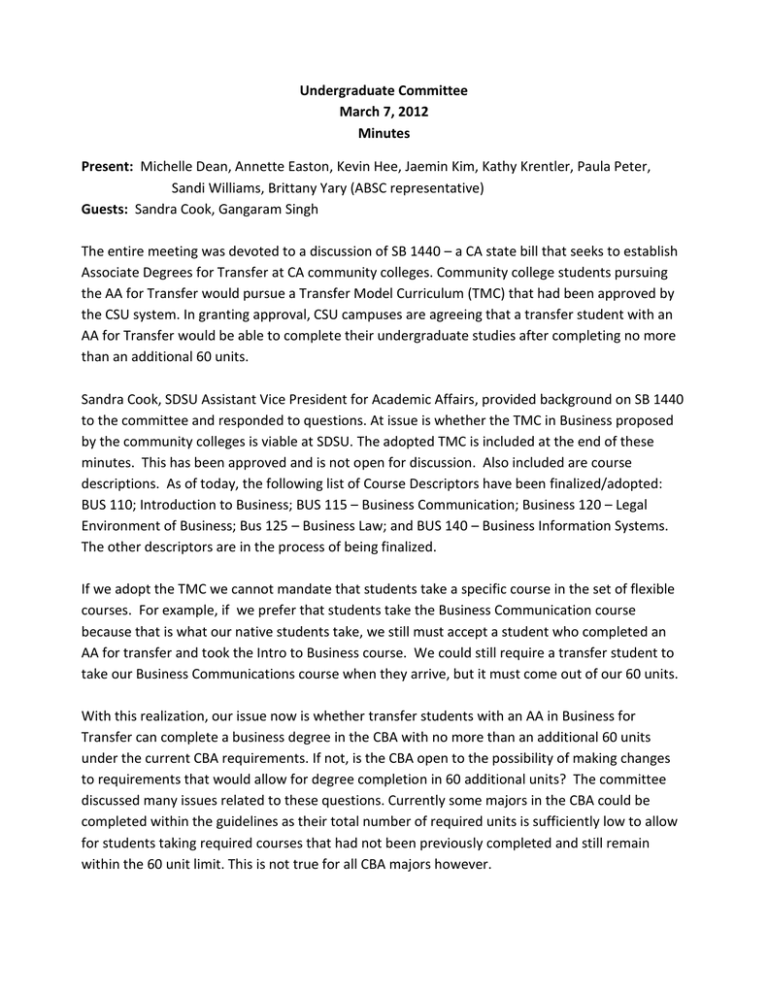
Undergraduate Committee March 7, 2012 Minutes Present: Michelle Dean, Annette Easton, Kevin Hee, Jaemin Kim, Kathy Krentler, Paula Peter, Sandi Williams, Brittany Yary (ABSC representative) Guests: Sandra Cook, Gangaram Singh The entire meeting was devoted to a discussion of SB 1440 – a CA state bill that seeks to establish Associate Degrees for Transfer at CA community colleges. Community college students pursuing the AA for Transfer would pursue a Transfer Model Curriculum (TMC) that had been approved by the CSU system. In granting approval, CSU campuses are agreeing that a transfer student with an AA for Transfer would be able to complete their undergraduate studies after completing no more than an additional 60 units. Sandra Cook, SDSU Assistant Vice President for Academic Affairs, provided background on SB 1440 to the committee and responded to questions. At issue is whether the TMC in Business proposed by the community colleges is viable at SDSU. The adopted TMC is included at the end of these minutes. This has been approved and is not open for discussion. Also included are course descriptions. As of today, the following list of Course Descriptors have been finalized/adopted: BUS 110; Introduction to Business; BUS 115 – Business Communication; Business 120 – Legal Environment of Business; Bus 125 – Business Law; and BUS 140 – Business Information Systems. The other descriptors are in the process of being finalized. If we adopt the TMC we cannot mandate that students take a specific course in the set of flexible courses. For example, if we prefer that students take the Business Communication course because that is what our native students take, we still must accept a student who completed an AA for transfer and took the Intro to Business course. We could still require a transfer student to take our Business Communications course when they arrive, but it must come out of our 60 units. With this realization, our issue now is whether transfer students with an AA in Business for Transfer can complete a business degree in the CBA with no more than an additional 60 units under the current CBA requirements. If not, is the CBA open to the possibility of making changes to requirements that would allow for degree completion in 60 additional units? The committee discussed many issues related to these questions. Currently some majors in the CBA could be completed within the guidelines as their total number of required units is sufficiently low to allow for students taking required courses that had not been previously completed and still remain within the 60 unit limit. This is not true for all CBA majors however. To date 12 CSU campuses have agreed to SB 1440 for business programs. For many of these campuses, however, it appears that not necessarily every major in the Business School is included in the agreement. The committee will need to explore the impact of only certain majors adopting the TMC. The Chancellors Office fully supports the implementation of SB 1440 and there is pressure on individual CSUs to do all that is possible to make this work. The committee agreed to continue investigation and discussion of this important initiative. Meeting adjourned at 11:00 a.m. Next Meeting: Wednesday, March 21st, 9:30 a.m.; Dean’s Conference Room Transfer Model Curriculum CCC Major or Area of Emphasis: Business Administration CSU Major or Majors: Business Administration Total units: 23 -29 (18-20 by double counting for GE) (all units are semester units) Required Core Courses (15-17 units): Title (units) C-ID Designation Financial Acct (3-4) Acct 110 Managerial Acct (3-4) Acct 120 Microeconomics (3) See sample Macroeconomics (3) See sample Business Law or Legal Environments (3) Bus 120 Bus 125 Rationale Commonly Required/ Essential Preparation Commonly Required/ Essential Preparation Commonly Required/ Essential Preparation/GE Commonly Required/ Essential Preparation/GE Commonly Required/ Essential Preparation List A: Select one of the following (3-4 units; 3 units may be GE): Commonly required/GE Business Calculus (3-4) See sample Commonly required/GE Statistics (3-4) See sample Commonly required/GE Finite Math (3-4) See sample List B: Select two of the following (5-8 units): Any course from List A not already chosen (3-4) Business Information Systems See samples (3-4) or Computer Skills (2-3) Intro to Business (3) or Bus 110 Bus 115 Business Communication (3) Important preparation Important Preparation Sample course descriptions: Microeconomics Econ 121 - Principles of Microeconomics (San Diego Mesa) This course is an introduction to economic analysis of specific decision-making sectors in the economy (micro analysis). Sectors include households, firms and government. Topics covered include productivity and costs for individual firms, industry types, the labor market, anti-trust issues, income distribution, and environmental externalities. This course is intended for business majors and all students interested in microeconomics. (FT). Associate Degree Credit & transfer to CSU and/or private colleges and universities. UC Transfer Course List. ECON 1, Principles of Microeconomics 3 units (Santa Monica College) Transfer: UC, CSU IGETC AREA 4B (Social & Behavioral Sciences) Prerequisite: None. Skills Advisory: Eligibility for English 1. This course introduces students to the supply and demand model, the concept of elasticity, productivity, cost structures, and alternative market structures. Within the Supply and Demand framework, the class studies the impact of government intervention on equilibrium price and quantity and on consumer and producer surplus. Additionally, students are introduced to the following market structures: Perfect Competition, Monopoly, Monopolistic Competition, and Oligopoly. These alternative market structures are evaluated in terms of their implications for prices, efficiency, and the role of the government. Macroeconomics Econ 120 - Principles of Macroeconomics (San Diego Mesa) This course is an introduction to aggregate economic analysis. Topics include market systems, aggregate measures of economic activity, macroeconomic equilibrium, money and financial institutions, monetary and fiscal policy, international economics and economic growth. This course is intended for business majors and all students interested in macroeconomics. (FT). Associate Degree Credit & transfer to CSU and/or private colleges and universities. UC Transfer Course List. ECON 2, Principles of Macroeconomics 3 units (Santa Monica College) Transfer: UC, CSU IGETC AREA 4B (Social & Behavioral Sciences) Prerequisite: None. Skills Advisory: Eligibility for English 1. This course introduces students to measurement of economic aggregates, economic models, and economic policy. Measures of economic aggregates include: GDP, the unemployment rate, the GDP Deflator, and the Consumer Price Index. The Great Depression is used as an introduction to macroeconomic policy. The course covers the tools of fiscal and monetary policy and their impact on aggregate demand, prices, income and interest rates. Additionally, the course introduces students to following models: Classical, Keynesian, Monetarist, and Supply Side with their corresponding policy implications and recommendations. Business Calculus DRAFT C-ID Description – Business Calculus Required Prerequisite: Intermediate Algebra Presents a study of the techniques of calculus with emphasis placed on the application of these concepts to business and management related problems. The applications of derivatives and integrals of functions including polynomials, rational, exponential and logarithmic functions are studied. Statistics DRAFT C-ID Description - Introduction to Statistics General, Business, and Social Sciences Required Prerequisite: Intermediate Algebra The use of probability techniques, hypothesis testing, and predictive techniques to facilitate decision-making. Topics include descriptive statistics; probability and sampling distributions; statistical inference and power; linear correlation and regression; chi-square and t-tests. Application of statistical software to data, including the interpretation of the relevance of the statistical findings Introductory Statistics for General, Business, and Social Sciences - Psychology - TCSU STAT 120 (Description obtained from a descriptor developed by CSU as part of LDTP) The use of probability techniques, hypothesis testing, and predictive techniques to facilitate decision-making. Topics include descriptive statistics; probability and sampling distributions; statistical inference and power; linear correlation and regression; chi-square and t-tests. Application of statistical software to data, including the interpretation of the relevance of the statistical findings. Finite Math DRAFT C-ID Description – Finite Math Required Prerequisite: Intermediate Algebra Linear functions, systems of linear equations and inequalities, matrices, linear programming, mathematics of finance, sets and Venn diagrams, combinatorial techniques and an introduction to probability. Applications in business, economics and social sciences. MATH 120 - FINITE MATHEMATICS 3 UNITS (MT. SAC) (CAN MATH12) Degree Applicable, CSU, UC; 54 hours lecture Prerequisite: MATH 71 or MATH 71X or MATH 71B or qualifying score on current department placement test. Mathematics for business, social science and biological science majors. Topics include linear programming, matrix theory, probability, statistics, stochastic processes, Markov chains, and math of finance. BIS DRAFT C-ID Description - Business Information Systems Required Prerequisites or Co-Requisites: Elementary knowledge of elementary computer operations, word processing, spreadsheets, e-mail, and Web browsing. Examination of information systems in business. Focus on information systems, database management systems, networking, e-commerce, ethics and security, computer systems hardware and software components. Application of these concepts and methods through hands-on projects developing computer-based solutions to business problems. Computer Skills: Introduction of computer hardware and software systems, including the impact of computers on society and related ethical issues. Focuses on the application of current computer technologies to work. Hands-on study of office productivity software includes elements of word processing, electronic spreadsheets, database, and presentation software. For example, see Fresno City College IS 15 – Computer Concepts.
